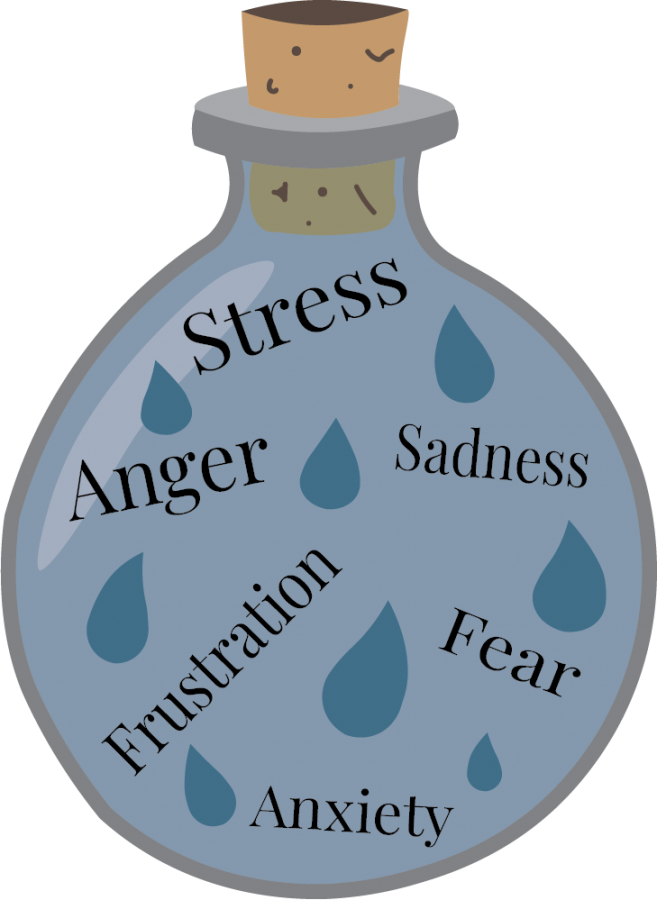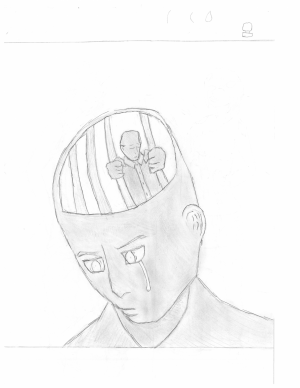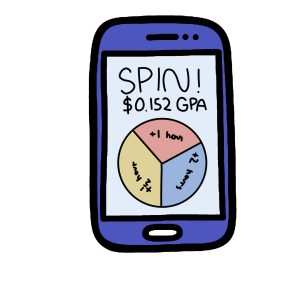Don’t bottle it up
Students should allow themselves to express their emotions
As individuals continue to live enthralled in their working lives, it often causes a lack of time for them to explore their emotions. This leads to many emotions being bottled up and set aside to be dealt with another time.
February 25, 2021
As we’ve endured almost a whole year in a pandemic, many of us have faced a whirlwind of emotions. Many of us often bottle up our emotions and set them aside to be dealt with later because of daily distractions with remote learning and constant changes to everyday life.
Avoiding emotions is not healthy in the long run. Crying, one of the most common ways most people express their emotions, is something many try to avoid. Crying is often frowned upon as it can be seen as embarrassing or a sign of weakness. However, in reality, it is the complete opposite.
For instance, crying can allow the growth of emotional intelligence. There is beauty and strength in allowing yourself time to cry, reflect and let everything out. Crying is also a form of self care; forcing yourself to bottle up emotions for long periods of time can cause intense mental breakdowns.
In an Op-Doc, the New York Times featured a short documentary from the 2021 Sundance Film Festival by filmmaker Noemie Nakai that followed “self-described tears teacher” Hidefumi Yoshida. This Japanese teacher, Yoshida, hosts workshops around Japan to aid adults in learning how to cry. He expresses that the traditional ideals of Japanese culture have historically looked down upon showing emotion by crying, which makes it difficult for many to cry, even alone.
However, this stigma around crying does not only exist in Japan, but all around the world. At Bonita Vista High (BVH), it is not common to cry in front of peers or in private because of the perception that crying represents weakness or is embarrassing. For example, a poll conducted by the Crusader on Feb. 8 revealed that, of 438 BVH students, 48.3 percent of students do not cry at any point throughout the week.
And while this can be for a multitude of reasons, this figure shows that students are not always taking the opportunity to reflect on their emotions by letting their tears flow.
With the stress of school and life in a pandemic, students can often feel at a loss for time and relaxation. But overworking yourself without any time for relaxation or reflection can break you down and make you less motivated to work over time.
In addition, overworking yourself can distance you from others and set unrealistic expectations of the reality because you’re resisting the natural urges to process and express hardship. The pandemic is hard, and that is okay. Crying offers the mental space to be human and allows yourself to fulfill those urges that are often pushed away.
Additionally, crying when needed can provide physical benefits alongside mental. According to Professor of Psychology at Northeastern University and author of “How Emotions Are Made” Lisa Feldman Barrett, “Crying can be very cathartic because when you cry, you are taking deep breaths.”
Barrett explains that these deep breaths and gulps for air between sobs allow for increased activity in the parasympathetic nervous system, which aids in calming you down.
Furthermore, Penn Medicine explains crying can help protect your eyes as tears contain an antibacterial chemical called lysozyme that can aid in fighting infections. Penn Medicine adds that crying has the ability to improve vision by hydrating the eyes which “increases our ability to focus our eyes and improve overall vision.”
With constant news of what seems to be a neverending pandemic, crying can be a beneficial way for you to process the events in your life. If you are not yet ready to explore taking time to cry, a helpful alternative is “to do nothing,” as expressed by Psychotherapist Kathryn Ford, Ph.D.
Another alternative that Yoshida utilizes for his students in his crying therapy is showing them various videos, both happy and sad that can encourage them to cry. For example, he shows videos of families, animals and sports that could all evoke an emotional response. He recommends that one should cry for at least a few minutes a month to detox the mind and center oneself.
“We need to have moments where we don’t put pressure on ourselves to accomplish anything. It’s OK to be disengaged but not be asleep,” Ford said in an article published by the New York Times. “While this may seem like an exercise in laziness, it’s often a great chance to noodle through your emotions.”
So, if you’re currently feeling the stress of distance learning, life or the pandemic, take some time to reflect and don’t stop yourself from expressing those emotions if needed.











Jared Phelps • Feb 25, 2021 at 2:12 pm
Thanks for taking the time to research the benefits of giving your emotions space. There is still definitely plenty of stigma associated with crying, breaking down, or just being overwhelmed. What’s interesting is that it seems most of us feel that stigma only toward ourselves…we’re happy to extend grace toward others who are having trouble, but not letting ourselves struggle at all!
It will take all of us shifting our expectations (especially for ourselves) to get all of us to an emotionally healthier place! Sometimes when I counsel students, there are tears. They almost always apologize, but I never fail to remind them they have nothing to apologize for. Our emotions are real, and we have little control over them!
Thanks, Jenny, for doing this work to help others learn to care better for themselves and their emotions.